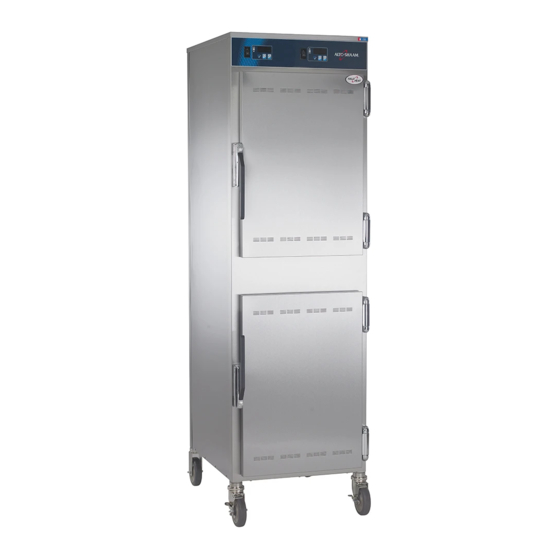Alto-Shaam 1000-UP/P Handbuch für Betrieb und Pflege - Seite 3
Blättern Sie online oder laden Sie pdf Handbuch für Betrieb und Pflege für Kommerzielle Lebensmittelausrüstung Alto-Shaam 1000-UP/P herunter. Alto-Shaam 1000-UP/P 17 Seiten. Food holding cabinet pass-through & reach-in, manual or electronic control

P R O C E D U R E S
1. Preheat at 200°F (93°C) for 30 minutes.
When the thermostat is turned clockwise to the ON
position, the indicator light will illuminate and will remain lit
as long as the unit is calling for heat. Allow a minimum of
30 minutes of preheating before loading the holding cabinet
with food. Closing the vents on the inside of the door will
speed up the process. The indicator light will go OUT after
approximately 30 minutes, or when the air temperature
inside the unit reaches the temperature set by the operator.
2. Load the cabinet with hot food only.
The purpose of the holding cabinet is to maintain hot food
at proper serving temperatures. Only hot food should be
placed into the cabinet. Before loading the unit with food,
use a food thermometer to make certain all food products
are at an internal temperature range of 140° to 160°F
(60° to 71°C). All food not within the proper temperature
range should be heated before loading into the holding
cabinet.
3. Reset the thermostat to 160°F (71°C).
Check to make certain the cabinet door is securely closed,
and reset the thermostat to 160°F (71°C). THIS WILL
NOT NECESSARILY BE THE FINAL SETTING.
The proper temperature range for the food being held will
depend on the type and quantity of product. Whether or
not the door vents should be open or closed will also
depend on the type of food being held. When holding food
for prolonged periods, it is advisable to periodically check
the internal temperature of each item to assure
maintenance of the proper temperature range.
Heat
Indicator
Light
Temperature
Gauge
Manual Control - Standard
Thermostat
#838/44 Operation and Care Manual •
T H E R M O S TA T
a n d H E A T L I G H T
S E Q U E N C E
Whenever the thermostat is turned ON the heat indicator
light will indicate the power ON/OFF condition of the
heating cable, and consequently, the cycling of the cabinet as
it maintains the dialed cavity temperature. If the light does
not illuminate after normal start-up, the main power source,
thermostat, and/or light must be checked. If the warming
cabinet does not hold the temperature as dialed, the
calibration of the thermostat must be checked. If the
warming cabinet fails to heat or heats continuously with the
thermostat OFF, the thermostat must be initially checked for
proper operation. If these items are checked and found to be
in order, a continuity and resistance check of the heating
cable should be made. SEE CIRCUIT DIAGRAM.
T H E R M O S TA T C A L I B R A T I O N
The thermostat is precision calibrated at the factory.
Normally, no adjustment or recalibration is necessary unless
the thermostat has been mishandled in transit, changed or
abused while in service. A thermostat with a sensing bulb
operates on hydraulic pressure, consequently, any bending of
the bulb results in a change in its volume, and alters the
accuracy of the thermostat calibration.
A thermostat should be checked or recalibrated by placing a
quality, thermal indicator at the center of an empty holding
cavity. DO NOT CALIBRATE WITH ANY FOOD
PRODUCT IN THE CABINET. The thermostat should be
set at 140°F (60°C), and should be allowed to stabilize at that
setting for a minimum of one hour. Following temperature
stabilization, the center of the thermal swing of the air
temperature within the cabinet should approximately coincide
with the thermostat dial setting.
If calibration is necessary, the calibration screw should be
adjusted with great care. The calibration screw of the
thermostat is located in the thermostat dial shaft. With the
shaft held stationary, a minute, clockwise motion of the
calibration screw appreciably lowers the thermostat setting.
A reverse, or counter-clockwise motion appreciably raises the
thermostat setting. After achieving the desired cycling of the
thermostat, the calibration screw must be sealed. Place a few
drops of enamel sealant directly on the calibration screw.
(Red nail polish or equivalent is acceptable.)
2.
